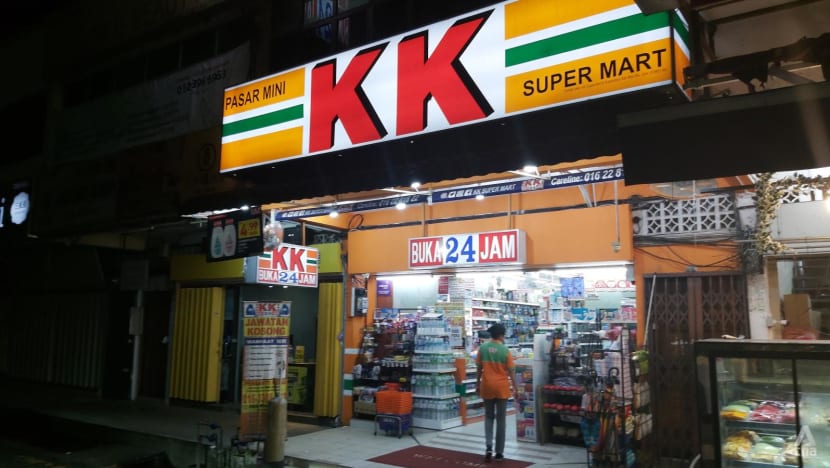
Commentary: The curious case of PAS’ stance against KK Super Mart boycott amid socks uproar
The closer Islamic party PAS gets to Putrajaya, the more it has to moderate its position, says political analyst James Chai.
A KK Mart outlet located in Kuala Lumpur. (Photo: CNA/ Rashvinjeet S Bedi)
Listen to this article
12 Apr 2024 06:00AM(Updated: 12 Apr 2024 02:25PM)
KUALA LUMPUR: Much has been said in the debacle over socks sold at various KK Super Mart outlets since images of the offending item were widely circulated on the internet on Mar 13, sparking strong criticism from netizens and politicians.
As the issue escalated over several weeks, calls were made for a boycott of KK Super Mart outlets nationwide; petrol bombs were thrown at a KK Super Mart store in Perak, then Pahang and Sarawak; and lawsuits were filed.
ADVERTISEMENT
Throughout the controversy, Parti Islam Se-Malaysia (PAS) has largely chosen to maintain a degree of separation. The party was not a vocal critic of KK Super Mart nor an advocate for the boycott calls, defying usual expectations.
OUT OF CHARACTER OR INTENTIONAL STRATEGY?
At first glance, this appears out of character. PAS, which backs a hardline interpretation of Islamic law, treats identity politics as their primary political capital.
Since becoming the largest opposition party, PAS has not abandoned its ways of focusing on race and religion. It has not developed policy sophistication in challenging the government on issues relating to the economy, education, trade, agriculture, poverty and others.
When the KK Super Mart socks incident broke out, it was United Malays National Organisation (UMNO) youth chief Dr Akmal Saleh who was the first to speak out, calling for a boycott against the minimart for allegedly insulting the religion.
ADVERTISEMENT
This boycott call was strong and consistent, defying ministers’ caution, and strained relations between the Democratic Action Party (DAP) and UMNO within the unity government.
Related:
PAS, on its part, called for strict actions to be taken against those responsible, but also advised caution against the ethno-religious conflict getting out of hand. This was the position taken by Prime Minister Anwar Ibrahim, the police and Malaysian king Sultan Ibrahim Sultan Iskandar – it was also arguably the most reasonable one.
At the tail-end of the controversy, PAS religious scholars council chief Ahmad Yahaya conclusively said that PAS was not and will not be part of the boycott. “(N)ot a single PAS leader called for a boycott of KK Mart,” said Mr Yahaya.
WHY DID PAS DISTANCE ITSELF?
Perhaps it was a timing issue. Perhaps PAS would have wanted to call for a boycott, but UMNO beat them to it. In the aftermath of the provoked outrage, Dr Akmal faced flak from several ministers for his push for the boycott.
Home Minister Saifuddin Nasution Ismail called on proponents of the boycott to stop inciting the public and take responsibility for the petrol bomb attacks. “These acts can result in destruction of public property and loss of lives,” he was reported as saying in local media.
Perhaps knowing the degree of damage, PAS did not want to be associated with the boycott movement, as it came with indirect responsibility and also a palpable chance of escalating a tense situation.
PAS has seen increased popularity in recent years amid growing Islamic conservatism among Malaysia's majority ethnic Malay Muslims. It emerged as a surprisingly powerful party in the November 2022 election, and has the greatest number of seats held by a single party in parliament.
No longer a regional party but a national government-in-waiting, PAS can no longer afford to take fringe positions that could heighten fragile ethno-religious relations in the country. The closer it gets to Putrajaya, the more it has to moderate its position.
At the same time, PAS may also not want to partake in a boycott movement that is led by UMNO, as that might be viewed as a first political alignment since the dissolution of the UMNO-PAS Muafakat Nasional pact. The three-year political cooperation ended acrimoniously, and it would not be surprising that PAS would adopt a cautious attitude by default in any partnership or alignment with UMNO.
NO DIRECT CONNECTION
However, the most likely reason is closer to what Mr Yahaya implied. He said that the KK Super Mart boycott is qualitatively different from the boycott of Israeli products, as the latter is “directly related” to Gaza, whereas in KK Super Mart’s case, there was “no direct connection”.
What Mr Yahaya meant was that although the KK Super Mart controversy started as a religious issue, the boycott itself was not. In other words, the boycott could be interpreted variously as commercial, racial, political or moral, but it might not be religious.
If we take that interpretation, it makes sense that PAS has taken a step back. Even though identity politics and Islam are often fused together, PAS is ultimately an Islam-first party, pursuing an Islamic state as the ideal political outcome.
Its strongest policy advocacy in the past few years, such as questioning Malaysia’s decision to gazette bak kut teh (pork ribs soup) as a national heritage dish, closing down gambling outlets, enhancing Syariah court powers and others, are driven by religious considerations. Therefore, if the KK Super Mart boycott is not markedly religious in target and outcome, it might not pursue it.
Such restraint, though self-serving, has important implications on how conflicts will play out in the future.
After the rare occurrence of the triple petrol bomb attacks in Malaysia, it is reasonable to ask if these are one-off incidents or potentially recurring.
Based on the highest authorities’ unanimous condemnation of violence, the containment of escalated conflict seems tight and effective enough for now. Of course, this does not mean that the policing of brands and logos that may offend the majority sensitivity will go away just yet.
However, understanding PAS’ nuanced take on what issues to take on shows that one less actor to escalate conflict might be the difference between peaceful status quo and going overboard.
James Chai is a political analyst, columnist and the author of Sang Kancil (Penguin Random House).



Ulasan
Catat Ulasan